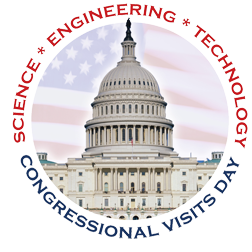Why You Should Participate in CVD & Advocate for Astronomy
Josh Shiode
This guest post comes from Kelly Korreck, an astrophysicist at the Smithsonian Astrophysical Observatory with a research focus on shock physics, solar instrumentation, and space weather. Kelly participated in our 2014 Congressional Visits Day. This post originally appeared on her blog.

Last March I had the honor to participate in our democracy and attend the AAS Congressional Visit Day. The visit was such a positive experience; I want to strongly encourage you to consider becoming involved in advocacy for astronomy as well.
You have never visited Congress? No worries! The visit to the congressional offices is actually a culmination of a few weeks of preparation. Once you are informed by the AAS that you were selected to attend, you get to work contacting your congressperson to set up a meeting. There is a directory online to find out this information based on your home address. Remember you are the congressperson’s constituent, and they are interested in hearing from you! In the AAS visit, you will also be visiting in small groups (2-3 people) so you also don't have to worry about doing this alone.
Over the next few weeks, Joel Parriott (AAS Director of Public Policy) and Josh Shiode (AAS John Bahcall Public Policy Fellow) take you through background information on the various agencies, the federal budget, and congressional structure to make sure you understand the congressional landscape. This information is given through a few short telecons and a briefing the day before your Hill visit.
My biggest concern before I went was: What would I say to a congressperson about astronomy that would be impactful? First, the AAS briefing stressed, do no harm. We are all astronomers and we are advocating for astronomy overall. It isn't fund one project over another. The visit is about being a source of information and anecdotes about how astronomy fits into local politics — all politics is local, after all. You will spend some time within your small group figuring out what are the main points you want to cover in the meetings. Focus on why your research is important to society. My group focused on jobs creation and the scientific pipeline created by the National Science Foundation (NSF) Research Experiences for Undergraduates (REU) program and advocated for a strong NSF budget. All three of us in the group had been part of the REU program in some way, and our enthusiasm for it showed. The NSF REU program is a compelling element of astronomy that touches on job creation, training the next generation, and creating a culture of innovation and inspiration — all things that are relatable in DC. But there are many ways an astronomer can be relatable to Congress, from participating in major missions, to educating the next generation at a university, to just being the inspiration to think about the big questions in life, such as “Are there other habitable planets?”
Why should you take 2-3 days out of your busy schedule to do this? Since most of our funding in astronomy is tied to the US federal government in one way or another, this experience was a great way to learn how the money is allocated to the various agencies that support our research. We all have to advocate for what we care about, and knowing how to do that most effectively is important. And you get to connect with new colleagues and spend a few days in DC visiting the Hill.
Sign up for this year's AAS Congressional Visits Day by Tuesday, 3 February 2015, at 5:00 pm EST!
Even if you cannot attend this event, check out the AAS policy page to see how you can otherwise participate and advocate for astronomy!

